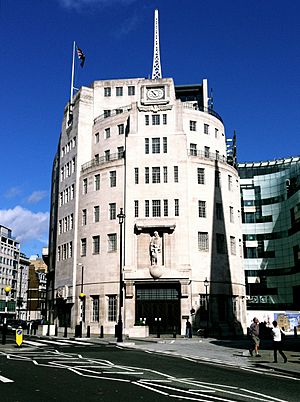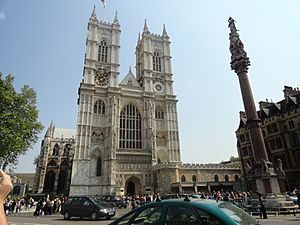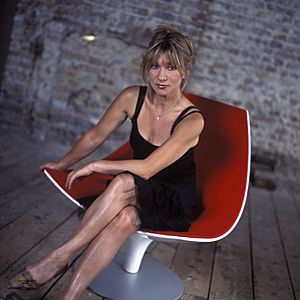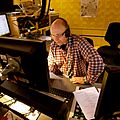BBC Radio 3 facts for kids

Logo used since 2022
|
|
|
|
|---|---|
| Broadcast area | United Kingdom and Internationally via Satellite and BBC Sounds |
| Frequencies |
|
| RDS | BBC R3 |
| Programming | |
| Language(s) | English |
| Format | Classical, jazz, world music, drama, culture, arts |
| Ownership | |
| Owner | BBC |
| History | |
|
First air date
|
30 September 1967 |
|
Former call signs
|
BBC Third Programme |
|
Former frequencies
|
648 MW (1967–1978) 1215 MW (1978–1992) |
| Links | |
| Webcast | BBC Sounds |
BBC Radio 3 is a national radio station in the United Kingdom. It is owned and run by the BBC. The station started broadcasting in 1967. It took the place of an older station called the BBC Third Programme.
Radio 3 mainly plays classical music and opera. But you can also hear jazz, world music, and radio plays. It also covers culture and the arts. The station says it helps create more new music than any other station in the world. It also helps young musicians from all over the world through its New Generation Artists scheme.
Every summer, Radio 3 broadcasts the BBC Proms concerts live. These are big music events. It also plays music from the BBC Orchestras and Singers. You can hear both old and new radio plays on the station.
In 2009, Radio 3 won a big award called the Sony Radio Academy UK Station of the Year Gold Award. It was nominated again in 2011. About 1.8 million people listen to Radio 3 every week. The person in charge of Radio 3 since 2015 is Alan Davey.
Contents
- A Look Back: The History of Radio 3
- How BBC Radio 3 Works
- Popular Shows on Radio 3
- Choral Evensong: A Long-Running Show
- Composer of the Week: Learning About Music
- Live Music: Lunchtime and Afternoon Concerts
- The Early Music Show: Music from the Past
- In Tune: Your Evening Music Fix
- Jazz Record Requests: For Jazz Lovers
- Pied Piper: Music and Stories for Kids
- Opera on 3: Live Opera Performances
- The Proms: Summer Concerts
- Radio 3 in Concert: Recorded Performances
- Record Review: New Classical Music
- Through the Night: Late Night Music
- The Verb: A Cabaret of Words
- News on Radio 3
- BBC's Music Groups
- Images for kids
- See also
A Look Back: The History of Radio 3
Radio 3 is the station that followed the BBC Third Programme. That older station started broadcasting on September 29, 1946. The name Radio 3 was first used on September 30, 1967. This was when the BBC launched its first pop music station, Radio 1. At that time, the BBC also gave new names to its other national radio channels. These became Radio 2, Radio 3, and Radio 4.
Before 1967, what we now call Radio 3 was a group of different services. These included:
- The original Third Programme, which played serious music and talks in the evenings.
- The Music Programme, which played classical music during the day.
- Sports coverage, mostly on Saturday afternoons.
- Educational shows for adults in the early evenings, called Network Three.
All these parts kept their own names within Radio 3 until April 4, 1970. Then, the BBC made more changes to how its radio stations worked.
How BBC Radio 3 Works
BBC Radio 3 broadcasts from studios in Broadcasting House in central London. This building was built in the 1930s. However, some shows and performances also come from other BBC places. These include BBC Cymru Wales in Cardiff and BBC North at MediaCityUK in Salford. The BBC also has special recording places at the Royal Albert Hall, the Royal Festival Hall, and the Queen Elizabeth Hall. This allows them to record and broadcast live performances from these famous venues.
You can listen to BBC Radio 3 in many ways. It is on the FM radio band between 90.2 and 92.6 MHz. You can also find it on DAB Digital Radio. It is available on digital TV services like Freeview, Freesat, Sky, Virgin Media, and Virgin Media Ireland. Plus, you can listen online or on the app through BBC Sounds. On BBC Sounds, you can also listen to past Radio 3 shows.
Radio 3 uses less "volume compression" on its FM frequencies. This means the music sounds more natural, with quiet parts being very quiet and loud parts being very loud. On DAB, you can choose how much compression you want.
Popular Shows on Radio 3
Choral Evensong: A Long-Running Show
Choral Evensong is a religious service from the Anglican church. It is broadcast live on Wednesday afternoons. The show comes from cathedrals, university chapels, and churches across the UK. Sometimes, it broadcasts services from Catholic cathedrals or other churches abroad.
This show is the BBC's longest-running live broadcast from outside a studio. The very first one was from Westminster Abbey on October 7, 1926. When the show moved from Radio 4 to Radio 3 in 1970, many listeners complained. Because of this, the BBC brought it back to weekly broadcasts.
Composer of the Week: Learning About Music
Composer of the Week started way back in 1943. It was first called This Week's Composer. Since 1988, it has been known as Composer of the Week.
Each week, the show focuses on one famous composer. There are five daily programmes that air at midday. They explore the composer's music in detail and play parts of their works. Composers like Bach, Beethoven, and Mozart are often featured. But the show also explores less known composers. The programme is written and presented by Donald Macleod.
Live Music: Lunchtime and Afternoon Concerts
These two shows play live or recorded music from different places across the country. The Lunchtime Concert is on from 1 to 2 pm. The Afternoon Concert follows from 2 pm until 5 pm.
The Early Music Show: Music from the Past
The Early Music Show plays European music from before the time of Bach. It is broadcast at 2 pm every Sunday. The episodes talk about the music, the people who play it, and different music styles. Lucie Skeaping and Hannah French are regular presenters.
In Tune: Your Evening Music Fix
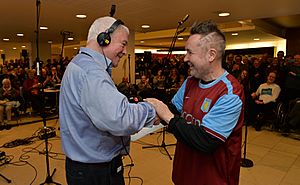
In Tune is a very popular early evening music show on Radio 3. It started in 1992. The show plays a mix of live and recorded classical and jazz music. It also has interviews with musicians and news about the arts. Sean Rafferty and Katie Derham are the presenters.
Jazz Record Requests: For Jazz Lovers
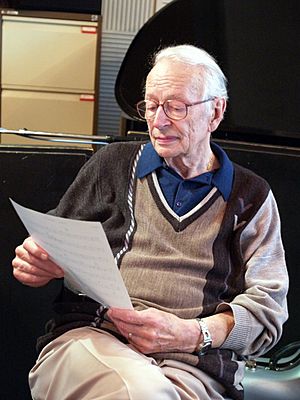
Jazz Record Requests was the first weekly jazz show on the BBC's Third Programme. It started on December 12, 1964. The jazz musician Humphrey Lyttelton was the first presenter. The show is still running today and is now an hour long. It moved to Sunday afternoons in 2019. Alyn Shipton became the presenter in 2012.
Pied Piper: Music and Stories for Kids
Pied Piper was a special show for children. It was presented by David Munrow, who knew a lot about early music. The show's full name was "Tales and Music for Younger Listeners." It ran from August 1971 to 1976. The show was fun and varied, made for kids aged 6 to 12. But older kids and adults also enjoyed listening! There were five series and 655 episodes in total.
Opera on 3: Live Opera Performances
This show is broadcast on Saturday nights. It features live performances by the Metropolitan Opera from the Metropolitan Opera House in New York City.
The Proms: Summer Concerts
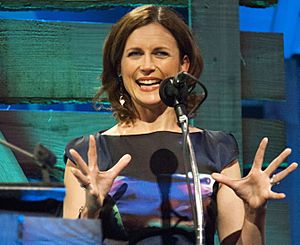
The annual BBC Proms concerts are broadcast live on Radio 3 every summer. The BBC started broadcasting the Proms in 1927. The BBC's involvement with the Proms led to the creation of the BBC Symphony Orchestra. Today, some concerts are also shown on BBC Four television. The Proms are mostly held at the Royal Albert Hall.
Radio 3 in Concert: Recorded Performances
Radio 3 in Concert is a show broadcast on weeknights. It plays recorded concerts from different places across the UK and Europe. Regular presenters include Nicola Heywood-Thomas, Martin Handley, and Petroc Trelawny.
Record Review: New Classical Music
Record Review is a Saturday morning show. It talks about new classical music releases, important topics, and interviews. The show also has a popular part called Building a Library. This part looks at and suggests the best recordings of specific music pieces. The current presenter is Andrew McGregor.
Through the Night: Late Night Music
This show broadcasts for six hours, starting late at night. It plays classical music and performances. The show is a national version of the BBC's Euroclassic Notturno.
The Verb: A Cabaret of Words
This show is presented by the poet Ian McMillan. It is described as a "cabaret of the word." It features the best poetry, new writing, and performances. It broadcasts for 44 minutes on Friday nights.
News on Radio 3
BBC Radio 3 mostly focuses on music and the arts. News is a smaller part of what it does. However, the station does provide short news updates. These are given every half hour in the morning and at 1 pm, 5 pm, and 6 pm. This allows listeners to switch to a news station if they want more details. Sometimes, during special events like the COVID-19 pandemic, Radio 3 has used news bulletins from BBC Radio 2.
BBC's Music Groups
Much of the orchestral music you hear on Radio 3 comes from the BBC's own Orchestras and Singers. These groups are:
- The BBC Symphony Orchestra and BBC Symphony Chorus, based in London.
- The BBC Concert Orchestra, based in Watford.
- The BBC Philharmonic, based in Salford.
- The BBC National Orchestra of Wales and the BBC National Chorus of Wales, based in Cardiff.
- The BBC Scottish Symphony Orchestra, based in Glasgow.
- The BBC Singers, based in London.
The BBC also works with the BBC Big Band and helps fund the Ulster Orchestra.
Images for kids
-
Radio 3 broadcasts the BBC Proms live every year from the Royal Albert Hall and other venues
See also
 In Spanish: BBC Radio 3 para niños
In Spanish: BBC Radio 3 para niños
 | Victor J. Glover |
 | Yvonne Cagle |
 | Jeanette Epps |
 | Bernard A. Harris Jr. |


